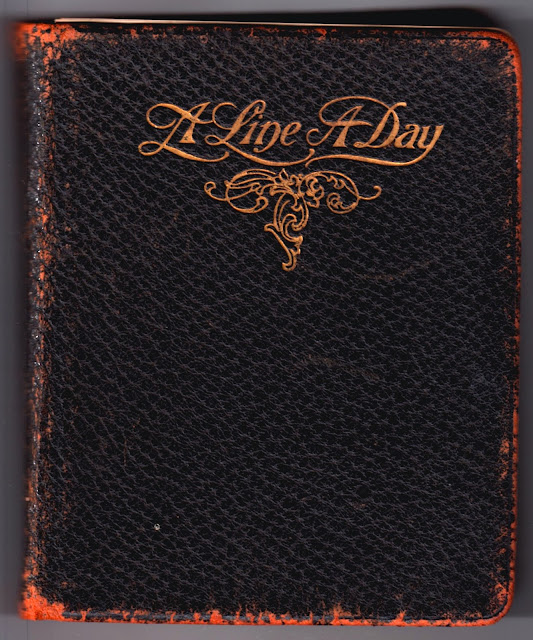As I have written elsewhere on this blog, "My paternal grandfather, Arnold G. Tew, attended Phillips Academy, Andover [Massachusetts] from 1910 – 1914. During 1913 and 1914 he had what was called “A Line A Day” diary. It is a small (4 ¾ in. by 5 ¾ in.), leather-bound volume with gilt-edged pages. The diary was able to accommodate five years of entries with four ruled lines per day. I came into possession of the diary going on three years ago. I have transcribed all of his diary entries for the years 1913 and 1914 -- except for those that were erased or presumably torn out by my grandmother decades later due to either her sensibilities or desire to protect the image of a nearly seventeen-year-old boy she never really knew. The diary is a wonderful trip into the language, teen slang, objects and interests of the period as well as one boy’s experience of prep school life at Phillips Andover at the beginning of the last century."
From time to time this year, I plan to post odds and ends from my grandfather's diary one hundred years to the day after he wrote them from his room at Phillips Andover. Here is his entry from April 11, 1913 . . .
The entry reads: "Was quite a rainy day still the temp. was quite high. The question for debate at Philo was 'Resolved, that the U.S. government should give independence to the Phillipines [sic].' Blackall upheld the aff. with Woodward assistant and Boynton upheld the negative with Woodbridge (assis.). Irving gave select reading from the anonymous poem 'How He saved St. Michael's.' Abbot gave the topics of the week."
It is interesting to read that one hundred years ago today prep school students were debating the merits of the U.S. granting independence to the Philippines. The Philippine Revolution began in 1896 while the Philippines was a colonial possession of Spain. When the Spanish-American War broke out in 1898 after American intervention in Cuba, U.S. attacks on various Spanish possessions -- including Pacific possessions -- led to U.S. involvement in the Philippine Revolution. Commodore George Dewey, who was in Hong Kong, sailed to Manila with the U.S. Navy Asiatic Squadron and defeated the Spanish in the Battle of Manila Bay on May 1, 1898. The Navy then transported the leading Filipino revolutionary, General Emilio Aguinaldo, back to the Philippines from his exile in Hong Kong. Philippine independence was proclaimed on June 12, 1898 from the Aguinaldo mansion in Manila, but the June 1898 declaration was never recognized by the United States or Spain and the Philippines (along with Cuba, Puerto Rico, parts of the West Indies and Guam) was ceded to the United States from Spain as part of the 1898 Treaty of Paris. The Treaty was signed December 10, 1898, but it was not effective until April 11, 1899 -- one hundred and fourteen years ago today (which is probably why Philo posed the debate question it did on April 11, 1913 -- the 14th anniversary of the effective date of Treaty of Paris whereby the U.S. ignored the Philippine Declaration of Independence)!
.jpg) |
| An artist's depiction of the June 12, 1898 Declaration of Independence from the Aquinaldo family mansion in Manila |
The machinations of the Treaty of Paris (1898) and the U.S. denial of the Philippine Declaration of Independence led to the Philippine-American War that ended only when General Aguinaldo was captured by the U.S. and subsequently accepted the sovereignty of the United States over the Philippines. Resentment and resistance continued in the Philippines until the U.S. granted independence to the Philippines after World War II on the 4th of July 1946 in the Treaty of Manila. Until 1964, the Philippines shared the 4th of July with the U.S. as their independence day celebration. Responding to pleas from historians and nationalists the Philippines legislature in 1964 passed a law designating June 12th as the actual Independence Day for the country. The U.S. presence in the Philippines, however, did not end until November 1992 when the U.S. flag was lowered at Naval Station Subic Bay and for the first time since the 16th century there were no foreign military forces on Philippines soil. Both Subic Bay and Clarke Air Force Base (closed in November 1991) were heavily damaged by the June 15, 1991 eruption of Mount Pinatubo, which was about eight times as forceful as that of Mount St. Helen in the U.S. Volcanic ash covered the bases to a depth of one foot or more.
_ _ _ _ _ _ _ _ _ _ _ _ _ _ _
Diary photos by the author.
Drawing interpreting the June 12, 1898 Philippine Independence Day from http://en.wikipedia.org/wiki/File:Independence-day1.jpg as a file available from the Wikimedia Commons which allows its free use with attribution (provided here via the above link).
"Philo" is the Philomathean debating society (the other one at Phillips Andover in 1913 - 1914 being Forum). My grandfather was Secretary of Philo in the Fall Term and Treasurer in the Winter Term.
"Boynton" is Nehemiah Boynton, Jr. "Woodward" is John Blossom Woodward. "Irving" is actually John Middleton Erving.
_ _ _ _ _ _ _ _ _ _ _ _ _ _ _
Copyright 2013, John D. Tew
_ _ _ _ _ _ _ _ _ _ _ _ _ _ _


John,
ReplyDeleteYou're lucky to have the diary, and I look forward to reading what he wrote long ago. The school isn't too far from me, and I've walked around the campus and took several cemetery photos of their private cemetery. Harriet Beecher Stowe is one person buried there.
On another note, I hope you had a lovely vacation in France.